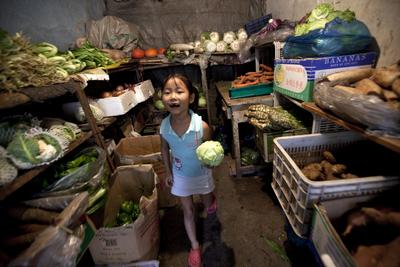Food inflation rose by 12 per cent in China and 14 per cent in Indonesia between March 2010 and March 2011. The current global food price situation is again driven by some of the same interconnected factors that led to the 2007-08 food crisis. In particular, expanding bio-fuel production, rising oil prices, U.S. dollar depreciation, export restrictions, and panic purchases are putting upward pressure on food prices.
High and volatile food prices undermine the food security of the world’s poorest consumers, who spend a large proportion of their income on food and have limited capacity to adjust quickly to rapid price increases. For poor agricultural producers, higher food prices can only be beneficial through higher incomes if they are net sellers of food and if input costs do not rise in parallel.
Urgent action needed
Given the complex interconnectedness of factors influencing global food security, a comprehensive approach is urgently needed by governments of developed and developing countries as well as international organizations to prevent the re-occurrence of another food crisis. This approach should comprise of a number of initiatives and reforms.
Public policies, particularly in developed countries, should aim to curtail and reform existing bio-fuel policies and subsidies so as to minimize the food-fuel competition and maximize environmental benefits whilst reducing the volatility that biofuels demand may have induced into international and domestic food markets. In the long run, the benefits and threats of crop-based biofuel production for food security and environmental sustainability need to be carefully evaluated in terms of their real contribution towards lowering greenhouse gas emissions and the carbon-intensity of transport fuels.
Social protection, especially in the form of social safety nets, is needed to protect the most vulnerable groups, including women and young children, in developing countries. In countries lacking established safety net programs, governments should begin the development of these programs immediately with a focus on the areas with extreme hunger, and should draw on best practices from other countries. Safety nets should be gender-sensitive and be effectively combined with interventions that increase the productive capacity and improve the health and nutrition of vulnerable households.
Reforms are also required to promote transparent, fair, and open global trade and to enhance the efficiency of global agricultural markets. National governments should eliminate existing export restrictions, such as export bans, and refrain from imposing new ones. Although export bans may help to secure domestic food supply, they lead to tighter markets for other exporting countries and induce panic purchases by food importing countries, both of which fuel further price increases and volatility. A quick and favorable completion of the World Trade Organization Doha Round will be essential to reduce the risk of the implementation of destabilizing policies on world food markets.
A global, emergency, physical, grain reserve should also be created to address food price crises. The reserve should be owned and managed by an institution like the World Food Program, which already has a global food management system in place. It should be created through grain stock donations from large food exporters, such as the United States and large food producers such as China and India. The reserve should be strategically positioned in these countries and in food importing poor countries, such as Bangladesh for easy and fast access. Due to the challenges of implementing such a system, it should be started on an experimental scale with relatively small reserves. The ASEAN+3 emergency rice reserve, currently under discussion is an example.
Public policy should also ensure that small farmers have opportunities to increase their productivity and income. Investments by national governments as well as global and regional institutions should focus on improved smallholder access to inputs such as seeds and fertilizer as well as financial and extension services and weather-based crop insurance. New agricultural technologies suitable for smallholders should also be strongly promoted and rural infrastructure should be strengthened to increase access to markets. Since climate change has significant implications for agricultural productivity and human welfare, it is important for national governments to invest in climate change adaptation and mitigation using the full potential that agriculture offers.
An international working group to regularly monitor the world food situation in a coordinated, transparent, and timely fashion and to trigger action in times of food situation anomalies in order to prevent excessive price volatility would also be worth establishing. This working group, made up of key institutions, should pay close attention to food production, consumption (including for bio-fuels), trade, stocks, prices, and policies, as well as energy prices, input prices, and financial market speculation. The group could also provide guidance on the optimal level of grain reserves to be held for food security emergencies, when and how to release them, and at what prices.
Shenggen Fan is Director General of the International Food Policy Research Institute (IFPRI). Washington. This article draws on Fan, S., M. Torero, and D. Headey. 2011, ‘Urgent actions needed to prevent recurring food crises’, Policy Brief 16. Washington, D.C.: IFPRI.


While many of the points in Fan’s article may sound good in theory, or in a hypothetical world, the reality of the world suggests that there may be many problems that may render good economic argument ineffective or unusable.
For example, when a country starts experiencing some sorts of problems, whether it is inflation, food, energy and so on, there are diverging international political interests regarding to the situation of that particular country.
It suffices to look no further than the reactions of different international communities to the recent and ongoing unrest in the Middle East and North Africa. One could imagine that even if mother nature does not provide cause for concern to some and possibly many countries, some nations would still create problems for some other countries to advance their own interests.
That is unfortunately the sad reality in world politics.
Any talk of food security must not be naïve and needs to take into account complex international politics and its implications.